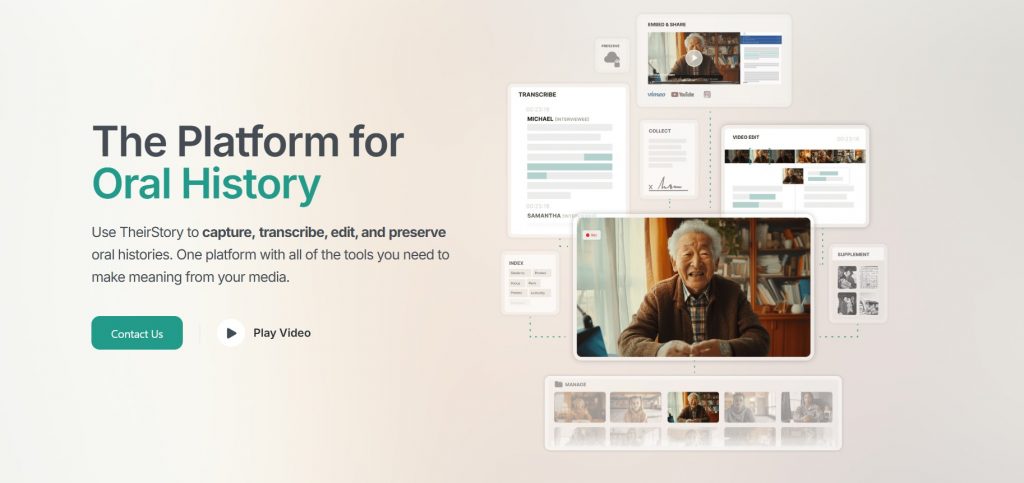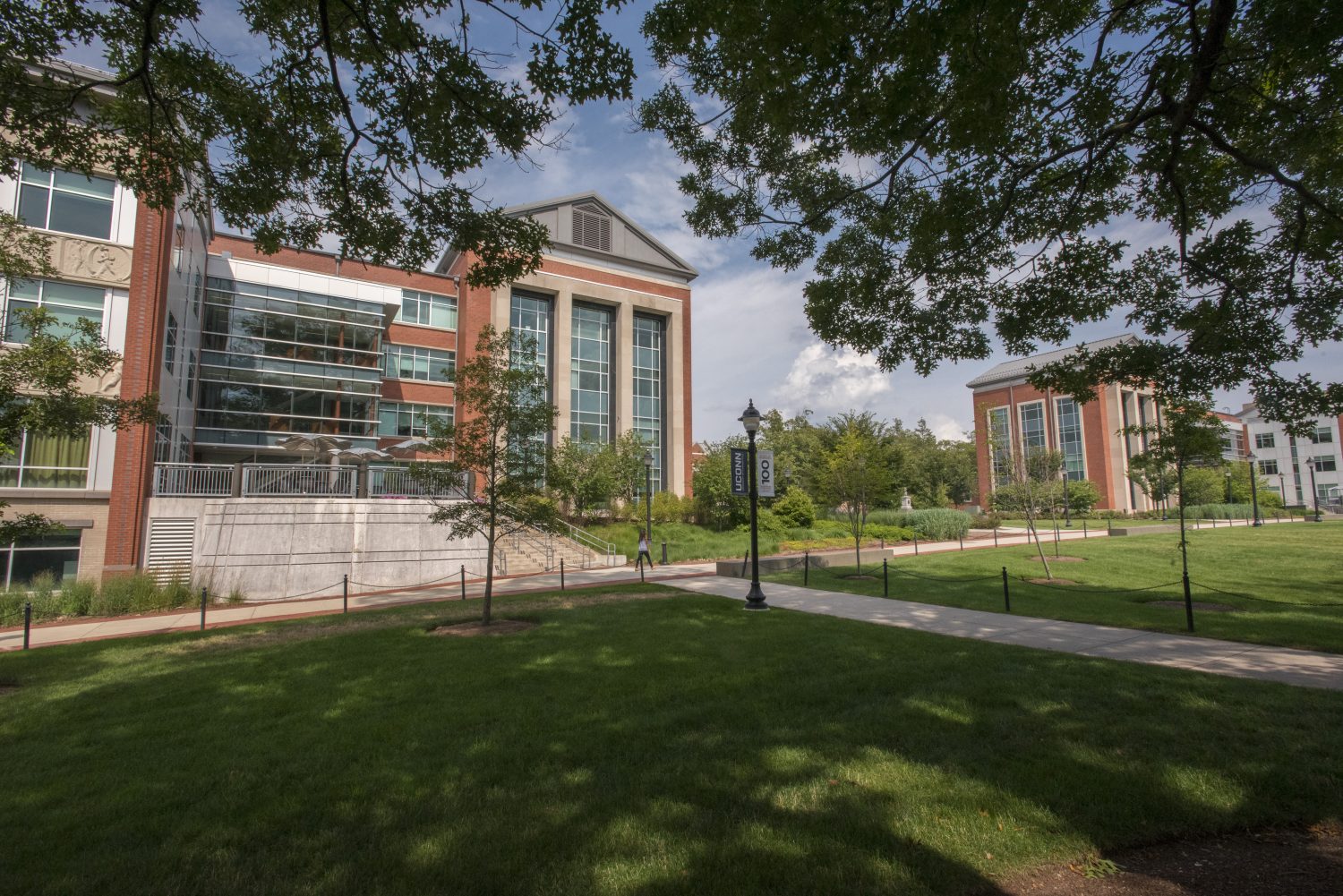Using TheirStory to Help Tell Our Stories
UConn professor and Associate Director of Africana Studies, Fiona Vernal, is making strides to preserve oral histories from Connecticut communities using a platform called TheirStory.
TheirStory is an oral history platform and was created during the pandemic. CEO Zack Ellis founded the company as a way to preserve his own family histories.
The platform has grown since its inception and is supported by a nationwide network of universities and historical organizations from UConn to UCLA. It has features to take people through every step of the process of oral history preservation. Users can record, transcribe, index, organize and more to tailor and share their oral histories.
“There are many, many ways that you can record. Recording has never been the problem when it comes to collecting stories. It’s always what happens after you record,” says Vernal. “How do you transcribe it? How do you share it? How do you produce it? How do you package it for preservation? TheirStory fits into that ecosystem by providing the last 50% of the miles that you need for processing.”
Vernal began working with Ellis and TheirStory in 2022. She was working on a project in Hartford on West Indian, African American, and Puerto Rican migrations to the city and received a call from Ellis. “I had been doing oral histories, but experiencing the same bottlenecks as everyone does,” says Vernal. “I ran my oral histories through TheirStory, and I was a convert immediately.”
“I had a vision for how to share this resource with other folks who were doing the same kind of work,” Vernal says. “If you don’t have a good way to process and generate a transcript, an index and a summary, it’s very difficult to do anything. And it was my mission to try and change that landscape.”
A State with Many Stories to Tell
Vernal and UConn began a partnership with Connecticut Humanities a year later. Vernal scaled her use of the platform from a personal level to a statewide collaboration between UConn, Connecticut Humanities, and the Connecticut Museum of Culture and History.
“One of the things that the UConn strategic plan does is that it forces us, as faculty, to figure out what statewide service we can provide to citizens,” Vernal says. “As a state entity, we owe it to the citizens, right? I take it as a serious charge and responsibility that UConn should be benefiting the state.”
Vernal credits Connecticut Humanities for helping expand her individual license as a researcher into a state license for anyone in Connecticut. The Connecticut Museum of Culture and History also helped expand this program into a statewide initiative, “Not just in terms of visibility, but also in terms of service,” says Vernal.
The Connecticut Museum of Culture and History had a COVID-era oral history project about the impact of the pandemic on the state. “They were at the beginning of a new oral history project that was more expansive, and not just focused on COVID, so it made sense for them to be our partners as well,” Vernal says.
The state license for oral history gives everyone in the state free access to the platform. It gives museums, libraries, students, community organizations and more the ability to learn more and utilize information on oral histories around the state.

One of the pilot projects UConn and Vernal worked on included an oral history project for the Connecticut River Museum’s 50th anniversary. Another was for the Mather Homestead in Darien, “Which involves a house museum connected to the Mather lineage of Increase and Cotton Mather in the 1600s,” says Vernal. The Mather family donated their home to become a museum, and they wanted to gather oral histories of the family for the archives.
Vernal also worked with the Windsor Historical Society, “which was looking at African American civic engagement in the town of Windsor, and also celebrating its own hundredth anniversary,” Vernal says.
Connecticut is rich in both history and communities with rich traditions, as the projects Vernal has been involved with demonstrate. At the Enfield Historical Society, there is an exhibition about African American Heritage. In Bloomfield, an exhibit on the town’s African American, Jewish and West Indian heritage will premiere in September 2025. The Caribbean Heritage Museum will open in October to overlap with Founders Day at the West Indian Social Club of Hartford.
“They are my longest-running collaborators,” says Vernal. “I’ve been collaborating with them since I was in graduate school, and they’re going to lend me a segment of the club to transform it into a permanent gallery for a Caribbean Heritage Museum. Folks can come and have that experience and figure out why Connecticut has West Indians as the largest foreign-born population.” It will be the first Caribbean Heritage Museum in the Northeast.
‘History is Unfolding Now’
Since activating the state license for the platform, Vernal and UConn have reported 107 projects signed up on TheirStory. Of those, about 50% are active, which means that people working on those stories are actively doing interviews and processing oral histories. “We thought we would get 50, and we’ve more than doubled that,” says Vernal. “For me, that’s been a resounding success.”
For people who want to share their own stories, Vernal describes the process as “frictionless.” “If you know how to use Zoom, then the barriers to entry are very low,” she says. “You get a link, curate your background for lighting and make sure you look the way you want to look, and then you can focus on being the center of attention for the moment without having to worry about controls.” The people at TheirStory and UConn take care of all the logistical matters, while participating individuals are only responsible for sharing their history.
Vernal is not worried about people fabricating their stories on the platform. “My mantra is that everyone is an expert in their own life story,” she says. “They might not be an expert into the statistical significance of their experiences, but they’re certainly an expert in their own life experiences and their own emotions.”
The access to these stories is something Vernal is excited about. “We have the State Historical Society, which is well-staffed, and then we have something like the Wintonbury Historical Society, which is all volunteer. So organizations that are poorly staffed or well-endowed can all use this platform and move forward with building up their collection,” says Vernal. “I like that leveling effect, because that’s what investment in infrastructure should do. It should make it possible that no matter what your entry point is, no matter what your size is, you’re getting the skills, training and software that you need to be successful in your specific mission. Whether you’re the kid who wants to interview your parent or you are the organization that wants to do 500 oral histories, you both get exactly what you need to be successful.
“I want to make the official case for oral histories as a way to build inclusive collections that help you document the ‘now.’ UConn has a tradition of robust support for oral history; this is part of our roots and our heritage,” says Vernal. “Organizations are obsessed with documents from the 1600s, 1700s, 1800s and the 1900s. History is unfolding now, we’re living through historic times now. We need to document these stories in real time, and oral histories can do that.”
Latest UConn Today
- A Dose of History: Pioneers of UConn PharmacyAt the center of UConn Pharmacy, celebrating its 100th year of excellence, innovation, and care, are the people. Acting as builders and changemakers – students and professors alike – the School is grateful to all who have made and continue to make UConn Pharmacy a place rooted in the progress of the past and propelled by the possibilities of the future. Here are three influential figures in the history of UConn Pharmacy, each of whom changed the School in ways still felt today.
- Neag School’s Adam McCready Wins Teaching AwardMcCready has been named the 2025 Dr. Perry A. Zirkel Distinguished Teaching Award recipient
- Neag School Honors Faculty and Staff With 2025 Annual AwardsThe Dean’s Office solicited nominations earlier in the spring for the Neag School of Education’s annual awards recognizing research, teaching, and service
- UConn School of Nursing Celebrates its 2025 GraduatesThe School of Nursing held its commencement ceremony on Saturday May 10, with over 200 students graduating
- Chinenye Anyanwu Named the 2025 School of Pharmacy Faculty Service Award RecipientThe School of Pharmacy Dean Robert L. McCarthy Faculty Service award is presented to a full-time faculty member who has provided outstanding service to their department, school, the University, the profession of pharmacy, and the public. This year, the recipient of the prestigious award is Chinenye Anyanwu!
- Commencement Speaker: Servant Leadership Distinguishes Top Companies, Stellar Executives from the RestRich Eldh '81 is the co-founder of SiriusDecisions, Inc., a B2B research and advisory firm, which he ran from 2001 until its sale in 2018. The company, which employed 400, provided advisory, consulting, and learning services to help executives improve the performance of their sales, marketing, and product strategies. Clients included Adobe, IBM, GE, Cisco, and Motorola.













